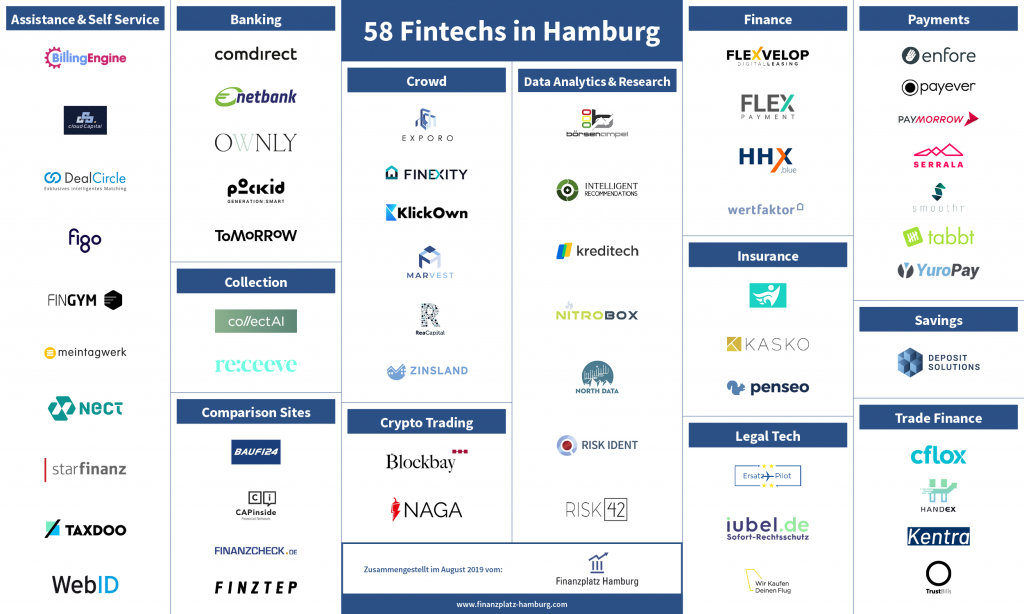Germany is one of the key fintech locations in Europe, and according to the country’s economic development agency, Germany Trade and Invest, the fourth largest in the world.
Germany’s booming fintech industry has been driven by robust funding from domestic and international investors, the federal government’s active support, and the country’s position as a leading financial center in mainland Europe.
Today, Germany is home to some 800 fintechs, according to the agency, and to seven of the top 50 most well funded fintechs, namely N26, Wefox, Raisin, Deposit Solutions, Smava, Kreditech and Solaris Bank.
German fintech hubs
In Germany, Frankfurt is often perceived as the nation’s fintech capital and there are good reasons for that. A major financial hub in Europe and home to the European Central Bank, Deutsche Bundesbank, the Frankfurt Stock Exchange, and 85 multinational banking headquarters, Frankfurt has both fintech talent and corporate demand for innovation. Numerous German and international banks have fintech programs in Frankfurt, including Deutsche Bank’s Digitalfabrik and Helaba Digital, and local startups enjoy a supportive environment that includes 32 incubators, 24 co-working spaces and 10 accelerator programs.
Berlin is another major fintech hub in Germany that is home to numerous innovation labs, accelerator programs and startup support organizations such as FinLeap, a venture capital (VC) firm focusing on fintech investments and operating one of the largest hubs for fintech startups in Europe, H:32. Berlin is also the birthplace of some of the country’s most exciting startups including fintech unicorn and digital bank N26, which has undeniably helped put the city on the fintech global map.
Hamburg’s fintech ecosystem is not as big as Frankfurt’s or Berlin’s but it has nevertheless witnessed significant growth over the past two years. Hamburg-based fintechs raised EUR 230 million in VC in 2017 and 2018, and according to data from Fintech Hamburg, the city’s finance industry is home to 58 fintechs, 50 banks and 29 ecosystem players, including trade organizations, accelerators and innovation labs. These together employed some 50,000 people, as of July 2019.
Some of Hamburg’s biggest fintech players include Kreditech, a lender using data available online to offer short-term loans, Finanzcheck, an online comparison engine for lenders and insurance brokers, and Figo, which offers a technical interface that allows banks to integrate innovative financial products into their online banking environments.

Fintech companies in Hamburg, by Fintech Hamburg, July 2019
In January, a new co-working space and fintech hub called Finhaven was launched in Hamburg to provide the growing fintech community with a location to work and collaborate.
In addition to offering 100 workstations over around 1,000 square meters, Finhaven aims to foster a strong community by facilitating networking and hosting meetups in its large event space. The location was the venue for events such as Fintech Week 2019, the largest fintech gathering in Germany.
German fintech funding
2018 was a record year for fintech funding with EUR 1.13 billion being invested in German fintech companies, a year-over-year growth of 55%.
The German fintech industry is continuing its momentum this year with EUR 600 million (US$677 million) being raised in Q1’2019, doubled the amount from the same period a year prior, according to a report from Barkow Consulting.
Q1’2019 fintech funding was driven by mega-rounds from several of the country’s fintech stars, including N26, insurtech startup Wefox, and pan-European fintech marketplace Raisin, which raised US$300 million, US$120 million, and US$114 million respectively.
N26, a digital bank valued at US$3.5 billion, has been one of Germany’s biggest fintech success stories. Since its launch in 2015, the company has signed up 3.5 million clients in 24 countries to its app-based suite of bank accounts, and has reportedly been adding 10,000 more every day. Co-founder Valentin Stalf told the Financial Times earlier this month the startup was looking to list on a stock exchange in three to five years.
Investors are bullish on German fintechs and continue to pour millions into fintech startups to help them expand and internationalize. Raisin is reportedly eyeing a US expansion, and online payments startup Wirecard secured investor Softbank as a partner earlier this year for its expansion into Asia, showcasing that German fintechs are now turning to internationalization as a means of growing scale. According to EY’s Germany Fintech Landscape report, released in November 2018, some 100 German fintechs are now operating abroad.
Booming insurtech segment
The German insurtech segment is gathering momentum, fueled by increased investment activity. Two of the five largest insurtech funding rounds in Q1’2019 took place in Germany, and Lemonade, a leading American insurtech company, recently entered the European market through Germany.
Silicon Valley VC firm Plug and Play runs its European insurtech program from Munich, and Insurtech Hub Munich, one of the twelve digital hubs initiated by the German federal ministry of economy, is supporting the local insurtech community through various networking initiatives and startup programs.
As of September 2019, there were 134 insurtech startups active in Germany, among which successful scale-ups like Friendsurance, ONE, simplesurance and wefox.
Though Germany has yet to see the birth of its first insurtech unicorn, consulting firm Oliver Wyman expects this to happen within the next two to three years.
Fintech regulation and government support
In terms of regulation, a fintech company’s business can fall under the German banking act, the insurance act or the investment act, and in case it does, it must obtain the relevant license. Necessary licenses can include banking licenses, licenses for providing financial services, payments services licenses and insurance licenses. Overall, the general logic here is that all players entering a regulated market must comply with the relevant existing regulations.
Though fintechs in Germany are not entitled to any “privilege” regulatory-wise, German financial regulators and policy-makers have been receptive to fintech innovation and committed to providing new entrants with support.
The Federal Financial Supervisory Authority (BaFin) implemented a project group focusing on fintech in late-2015, and has been pursuing a technology- and innovation-friendly administrative practice by communicating clearly and promptly, as well as hosting and participating in various events.
Featured image credit: Unsplash






